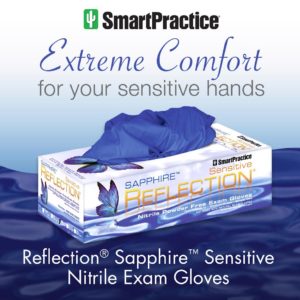
Prevent an Allergic Reaction to Nitrile, Latex and Chlorprene Gloves
According to Medical Director and SmartPractice CEO, Curt Hamann, MD, your skin is your most important protection against pathogens. But if you’re sensitive to some of the chemicals used to make the gloves you’re wearing, you can compromise your best protective barrier. Research has shown that some who experience a rash or irritation and assume they are allergic to latex rarely are. Once tested, they may find they are sensitive to products used in the office or chemicals used to manufacture latex and non-latex gloves.
The sensitivities described above may manifest in Type IV ACD (Allergic Contact Dermatitis). ACD is characterized by localized swelling, skin thickening, cracking, peeling, scabbing, crusting, scaling, itchiness, redness, fissures, papules and vesicles.*
As stated in an article co-authored by Dr. Hamman, symptoms of dermatitis affect more than 20% of dental professionals.**
Reflection Sapphire Sensitive Nitrile Gloves are NOT manufactured with these chemicals that may cause allergic reactions:
- Natural Rubber Latex
- Accelerators
- Thiurams
- Thioureas,
- Dithiocarbamates
- Benzothiazoles
- Guanidines
Besides reducing your risk of sensitivity to the chemicals above, why should you choose Reflection Sapphire Sensitive Nitrile?
- They mold to your hands’ natural shape, relieving finger and thumb pressure
- They combine strength and stretch and are puncture resistant
- Offer excellent tactile sensitivity
- They’re textured and powder-free for comfort and control
How to Manage Skin-Related Allergies
As a healthcare professional, you work with many products that may be allergens or irritants in the office. It’s important to get an accurate diagnosis to find out what’s causing any adverse symptoms. Also, Dr. Hamann advises that your choice of glove should take into account your total allergic profile and the occupational hazards that may put you, your staff, and your patients at risk: soaps, lotions, disinfectants and adhesives, to name a few.*
Seek the diagnosis of a clinician trained in occupational allergies, who will combine an assessment of your medical history with diagnostic tests designed to point out the cause of your sensitivities. You may then be advised to change the products you use or modify work practices to avoid the allergen or irritant. Remember, avoidance is the only effective way to manage both Type I and Type IV Hypersensitivities.
If you or someone in your practice has been tested and diagnosed with an allergy or sensitivity to Natural Rubber Latex, accelerators, Thiurams,
How much of a concern have sensitivities and allergies been in your practice? What solutions are you using to keep allergens at bay? Let us know in the comments!
*”The Latex Problem: It’s More Complicated than You Think,” reprinted with Permission of Dentaltown Magazine and Dentaltown.com
**“Hamman, P., Curtis, J., Rodgers, Pamela, & Sullivan, Kim. “Overcoming Allergy Roadbloacks.” Retrieved from Dentistryiq.com







